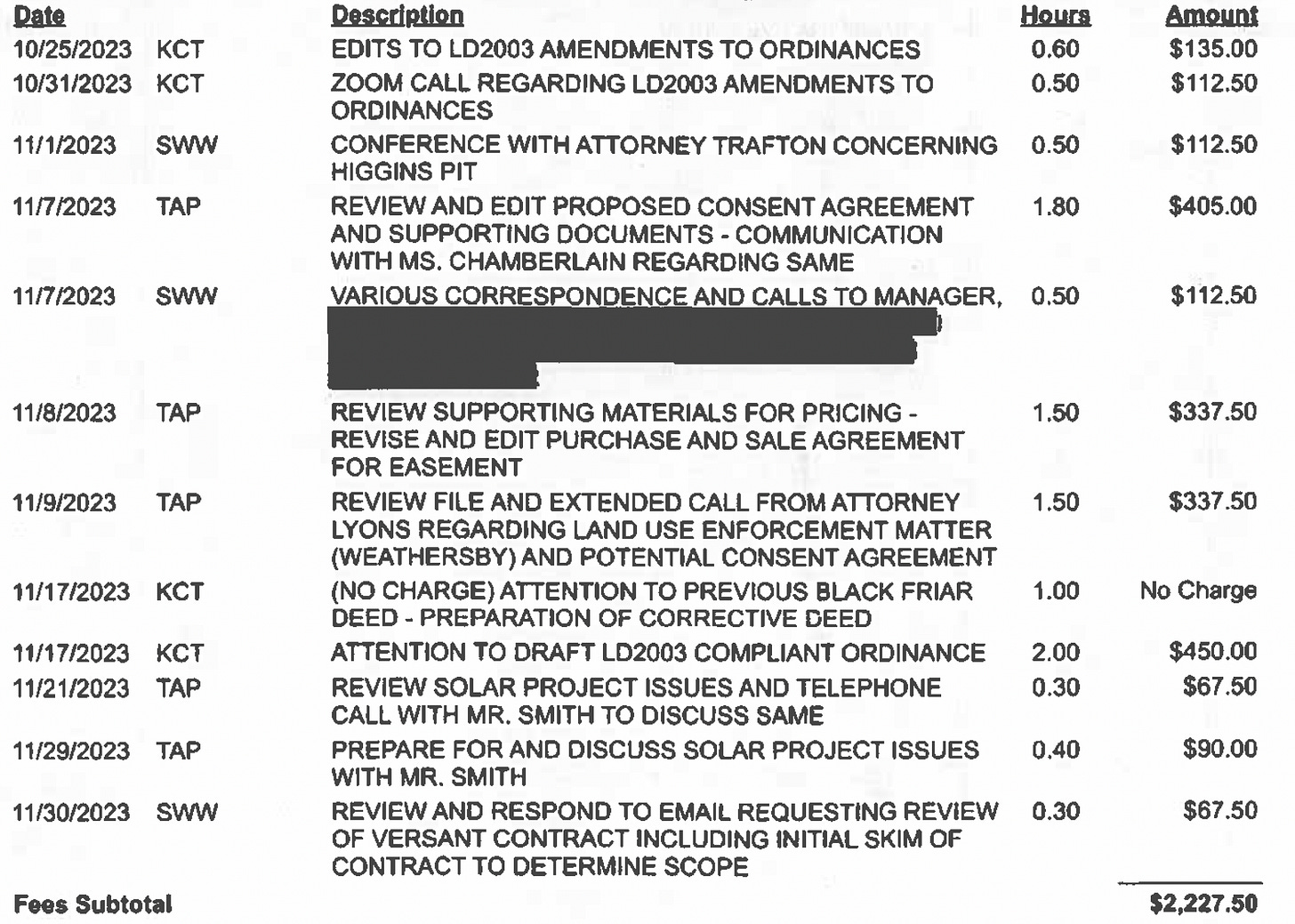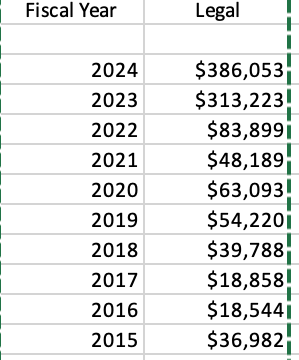Town Council resorts to sloganeering - 'governance by litigation' - to make its case
But are the claims true, that cruise ship lawsuits have changed fundamental governing of the town? A QSJ investigation reveals a more disturbing trend
BAR HARBOR, Aug. 8, 2024 - The Town Council has made it a priority to eliminate “governance by litigation” from the local vernacular, a slogan it created and uses with profligacy as it campaigns to win the hearts and minds of voters.
Looking at the town’s legal costs over the last five years, it’s easy to see why. It’s gone from $48,189 in 2021 to $386,053 in FY24 which ended June 30.
It is a major narrative behind the council’s effort to repeal the citizens ordinance capping cruise ships passengers and to replace it with an industry friendly version so that the town may return to normalcy. (Another narrative gaining traction was the assertion that citizens didn’t know what they were voting for when 58 percent of them approved the 1,000-passenger-day cap on Nov. 8, 2022.)
Councilors feigned outrage every time Finance Director Sarah Gilbert reported a new record year for legal costs, after the town was sued in late 2022 over the ordinance.
Members said the rising legal costs were unsustainable, especially the cruise ship lawsuits.
But lawsuits from land-use decisions is a fixture in municipal governance. Mount Desert has been battling for more than 10 years a company which wants to extract stones from a quarry shut down decades ago and is now in the middle of a residential neighborhood.
The town is also battling opposition to a housing project in the Village of Northeast Harbor.
As a result, Mount Desert spent $168,712 for legal services in FY24, or more than twice its budget of $63,500. “Most of the overages were due to the housing and quarry issues.” Town Manager Durlin Lunt stated in an email.
But no one on the select board has launched a campaign to decry “governance by litigation.” In Mount Desert, no one doubted the town would defend itself in court as an assumed cost of running the town.
The QSJ set out to determine exactly how much the cruise ship litigation has cost taxpayers in Bar Harbor - to understand how it became a lightning rod of controversy.
Was it as much as the $11 million overrun for the new school project, or the $4.5 million abandoned Higgins Pit project or even the seven-figure annual cost to dispose the town’s garbage at a landfill?
Turns out the cruise ship litigation was far from the biggest legal expense this previous fiscal year.
According to an analysis of invoices obtained by the QSJ, the town spent $119,000 in FY24 defending itself against the APPLL lawsuit and to seek counsel on ways to mitigate such a burden.
About $60,000 of that was for a three-day trial in Bangor in July in front of a federal judge who ended up siding with the town and its co-defendant/intervenor Charles Sidman, whose legal bill was borne by him and fellow citizens. So the taxpayers got a free ride from its partner Sidman.
Was that money well spent? The town heralded its victory, although much of the credit was owed to Sidman, who insinuated himself onto the defense team to ensure the town would do its job. How many Maine towns have won a federal court decision on “home rule?”
Then something bizarre happened. One week after U.S. District Court Judge Lance Walker ruled in favor of the town’s ordinance, the council issued a “press release” announcing it would not enforce the ordinance this year, that it was too late in the season and unfair to the cruise ship industry to do so. (As opposed to being unfair to its citizens.)
The council and its chair based its actions partly out of concern for its escalating legal bills without stating exactly how much that was.
Who was the wizard behind the curtain, flashing scary scenarios to prolong the agony?
What if the council had taken a different tack and began to enforce the ordinance with the firm hand of a federal judicial ruling? APPLL repealed and was rebuffed by the same district court judge who denied its injunction relief. APPLL then appealed to the federal appellate court in Boston and again was rebuffed in a one-sentence ruling.
That was not a good sign for APPLL, as courts tend not to dismiss motions so summarily unless it was confident there was not basis for the motion.
What if the town attorney moved to cut off APPLL at the choke point? Instead he devised a different strategy for the town to play defense while it had the momentum for offense.
At the cruise ship Planning Board hearing Wednesday one resident, Brad Haskell, said, “I as a citizen am okay with paying for litigation.”
How many Brad Haskells are out there?
Does the council know or even want to know? Who has a true pulse on the electorate?
Or does it matter?
After the council’s capitulation to the cruise ship industry on March 6, Sidman filed a suit in Superior Court to compel the council to do its job.
The town spent $40,000 to defend itself against Sidman. More work for town attorney Stephen Wagner.
The legal invoices obtained by the QSJ was through a Freedom of Information Act request for which the QSJ paid $200 for 10 hours of work by Town Clerk Liz Graves to unearth the invoices.
I’ll leave it to readers to decide whether such a legal tab on a tax base of $2 billion is sound governance. It amounts to about $50 on an average tax bill.
The legal fees for the APPLL and Sidman lawsuits totaled about $160,000, or about 40 percent of the entire legal bill for FY24.
The lion’s share were for more perfunctory services, as outlined in the invoices below:
The more alarming increase was the frequent use of the town’s outside counsel by town staff in FY24 - almost 60 percent of the $386,000 expenditure.
Litigation comes and goes, but an institutional reliance on legal services becomes a habit and an annual cost baked into the budget. Here are the Bar Harbor legal expenses for the last 10 years.
The surge in legal fees in 2023 also coincided with the naming of Wagner of Rudman Winchell as the town attorney.
Wagner has become a household name in Bar Harbor. He seems to be everywhere - at Town Council meetings, Planning Board meetings and on call for virtually every request from the town.
(Can you name the town attorney before Wagner and his predecessor?)
How did he become the moderator of the annual town meetings at $245 an hour, with another Rudman Winchell lawyer in tow? In neighboring towns, they continue to rely on citizen moderators - $400 a meeting in Mount Desert, $155 a meeting in Tremont and $125 in Southwest Harbor.
The ubiquity of Wagner’s presence doesn’t seem to alarm any councilor.
(I’ve written before - from my experience as an executive managing budgets and staff much bigger than that of Bar Harbor - that an outsized influence of a lawyer or an accountant on an enterprise is a troubling sign about the well-being of that enterprise.)
If that’s where the council headed, let’s be transparent about the fiscal toll it extracts. Let’s not hide it behind some convenient slogan which cheapens the dialog and inflames and blurs the public discourse.
I asked Town Manager James Smith what action he has taken to monitor the town staff’s over-use of legal services. He refused to respond.
Last night, Wagner told a packed council chamber full of mostly voters opposed to his scheme to wipe out the citizens ordinance “like it never existed” that he is filing court action against 55 West Street for its refusal to comply with the town’s ordinance to require a permit to disembark passengers.
How does he do that with a straight face right after he disavowed the citizens ordinance in the same meeting and is working to repeal it?
Or is that the business model for Rudman Winchell?
I am contemplating filing another FOAA request for FY23. The bill that year came in at $313,223, a jump from $83,899 in 2022.
I’m happy to share the FY24 invoices. You may view them by clicking here. If you spot an anomaly, send me an email.
The QSJ is awaiting the week’s public hearings on cruise ships to complete before reporting an analysis. Stay tuned.





As a former city attorney responsible for managing municipal litigation for 150,000 citizens, I would remind Bar Harbor that the town has a unique resource -- the authority to impose taxes and fees to recover excessive legal expenses from businesses which unreasonably persist in litigating against the town.
ThankYou Lincoln Millstein. ThankYou Charles Sidman. ThankYou Judge Lance Walker. And all of you who refuse to be pushed back and ground down by corrupt officials conspiring with unscrupulous business people.
The results of elections, expressing the will of the people, is paramount. Perhaps this year more so. How is it a Federalist Society judge fast tracked to bench by TeaParty Gov. Paul LePage and MAGA Pres. Donald Trump can understand the constitutional primacy of the people expressing their will through voting? While this passel of rogues, who preen themselves on being respectful civil servants and local entrepreneurs, usurp the authority of the ballot and scheme their little schemes of overturning the law. These folks bursting with pride of place and position. These self appointed arbiters of community values.
Where are Stephen King and Mel Brooks when we need them?